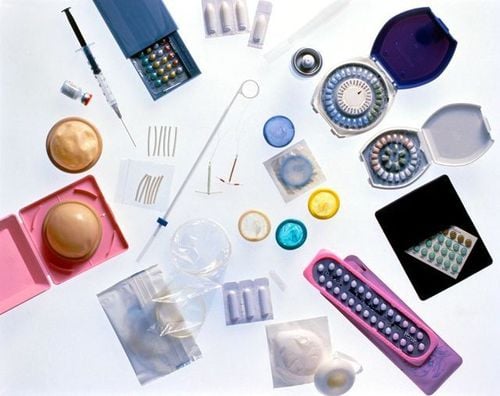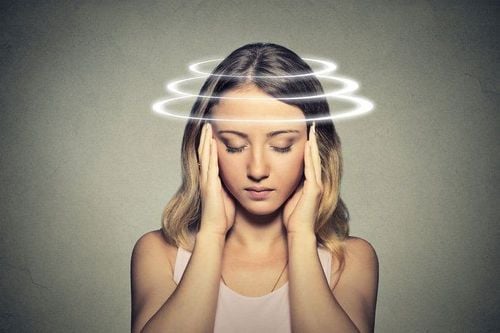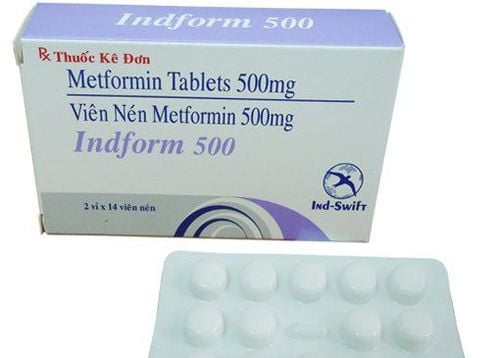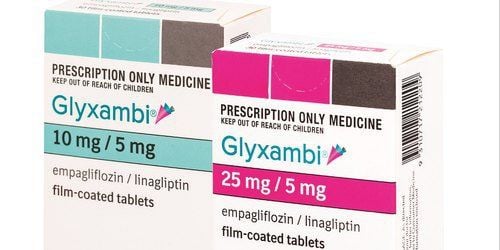This is an automatically translated article.
Changing hormone levels in a woman's body can trigger a migraine attack. It can be a migraine before or after menstruation, when taking birth control pills or using hormone replacement therapy.1. Migraines caused by changes in female hormone levels
Migraines are associated with changes in hormone levels that occur in a woman's body. It can be a migraine just before or after a period (called a menstrual migraine) or occurs when using oral contraceptives, especially those taking high doses of estrogen; or from hormone replacement therapy used during menopause to maintain female hormone levels in the body.
The cause of menstrual migraine is due to the sudden drop in estrogen and progesterone levels before menstruation. For birth control pills, for 3 weeks you take a combination of two hormones, until the week of your period, you take a placebo or no pill at all. This leads to a sudden drop in estrogen that triggers a migraine attack. If headaches occur during your period while using birth control pills, you should consult your doctor to reduce the dose of estrogen or progesterone to limit the side effects of the pill.
2. Menstrual Migraine Treatment

Thuốc chống viêm không steroid (NSAID) có thể điều trị chứng đau nửa đầu kinh nguyệt
Menstrual migraines are treatable with certain nonsteroidal anti-inflammatory drugs (NSAIDs) such as ibuprofen or naproxen. The drug also works to relieve pain in the lower abdomen during menstruation. Triptans are a group of drugs used in the treatment of migraines and cluster headaches, and can also be used in the treatment of menstrual migraines. Medicines relieve migraine pain by acting on the release of certain chemicals in the brain.
For effective migraine relief, you need to take non-steroidal anti-inflammatory drugs (NSAIDs) or triptans 1 to 2 days before your period starts and use it for more than 1 day. the week.
Alternatively, you can use gammaCore, a device that helps manage headaches. It is a non-invasive X (vagal) nerve stimulant that can be placed on the neck to relieve migraine pain.
2. Preventing Menstrual Migraines
Prevent menstrual migraines by using birth control in the form of pills, patches or vaginal rings. However, it will take time to experiment with hormone combinations or change the dosage until you find the right one. Your doctor may also recommend continuous use of birth control for an extended period of time to limit the risk of a migraine attack.
If your migraine is accompanied by dizziness, you should not use hormonal contraceptives because it increases the risk of stroke. Even if you are not dizzy, you will not be prescribed birth control pills if you are over the age of 35 and smoke, have high blood pressure, high cholesterol, are overweight or have diabetes .
In addition to therapeutic purposes, naproxen and triptans also have a preventive effect on menstrual migraine. If you don't respond to treatment, you may have migraines 4 days a month. At this point, your doctor may prescribe certain medications, such as anti-seizure medications, blood pressure medications (beta blockers or calcium channel blockers) and antidepressants, more often to reduce frequency. and severity of migraine attacks.

Sử dụng các biện pháp tránh thai giúp Phòng ngừa chứng đau nửa đầu do kinh nguyệt
If treatments don't work, your doctor may recommend a CGRP inhibitor. You can also choose other remedies like magnesium supplements, even acupuncture. However, you need to consult a doctor before using any supplements as they are not tested like prescription drugs and may contain ingredients that are not safe for health.
In addition, migraines can also be prevented by using 3 types of devices including:
Cefaly works to prevent migraines by sending electrical impulses through the forehead to stimulate nerves Menstruation associated with migraine headaches. SpringTMS is a small magnet that is placed at the back of the head during a migraine attack. Then, under the action of electrical impulses, the migraine pain will be reduced. The GammaCore is a handheld device placed on the side of the neck that provides mild electrical stimulation to the vagus nerve to end migraines.
3. Migraine in pregnancy
Migraines caused by changes in female hormone levels usually go away during pregnancy. You can still get headaches during the first trimester and go away after that.
You should avoid using migraine medicines during pregnancy. If you want to use mild pain relievers such as acetaminophen, consult your doctor before using them.
4. Migraine in menopause

Miếng dán estrogen
Women's migraines are usually better with the complete cessation of menstruation, which occurs with the onset of menopause.
Menopausal women using hormone replacement therapy should note that if they have migraine symptoms and the pain increases over time, they should notify their doctor to reduce the dose or prescribe other forms. even stopping hormone therapy.
If you're taking estrogen therapy, using an estrogen patch will help keep hormone levels more stable, reducing the severity of migraines.
Migraine headache is a common disease, for women, it can be caused by hormonal changes. Migraine is easy to diagnose but also easy to recur, so it needs to be monitored and treated promptly.
At Vinmec International General Hospital, there are now a team of specialists with extensive experience in the fields of neurology - stroke, obstetrics and gynecology, and modern equipment including Cathlab room, DSA scanner. The full option has all the functions for neurological intervention, where many high-tech techniques can be deployed to intervene in neurological diseases - stroke.
Please dial HOTLINE for more information or register for an appointment HERE. Download MyVinmec app to make appointments faster and to manage your bookings easily.
Reference source: webmd.comLEARN MORE
Migraine throbbing with prolonged pulse: What to do? Migraine during pregnancy and postpartum: What you need to know Factors that can trigger migraines













